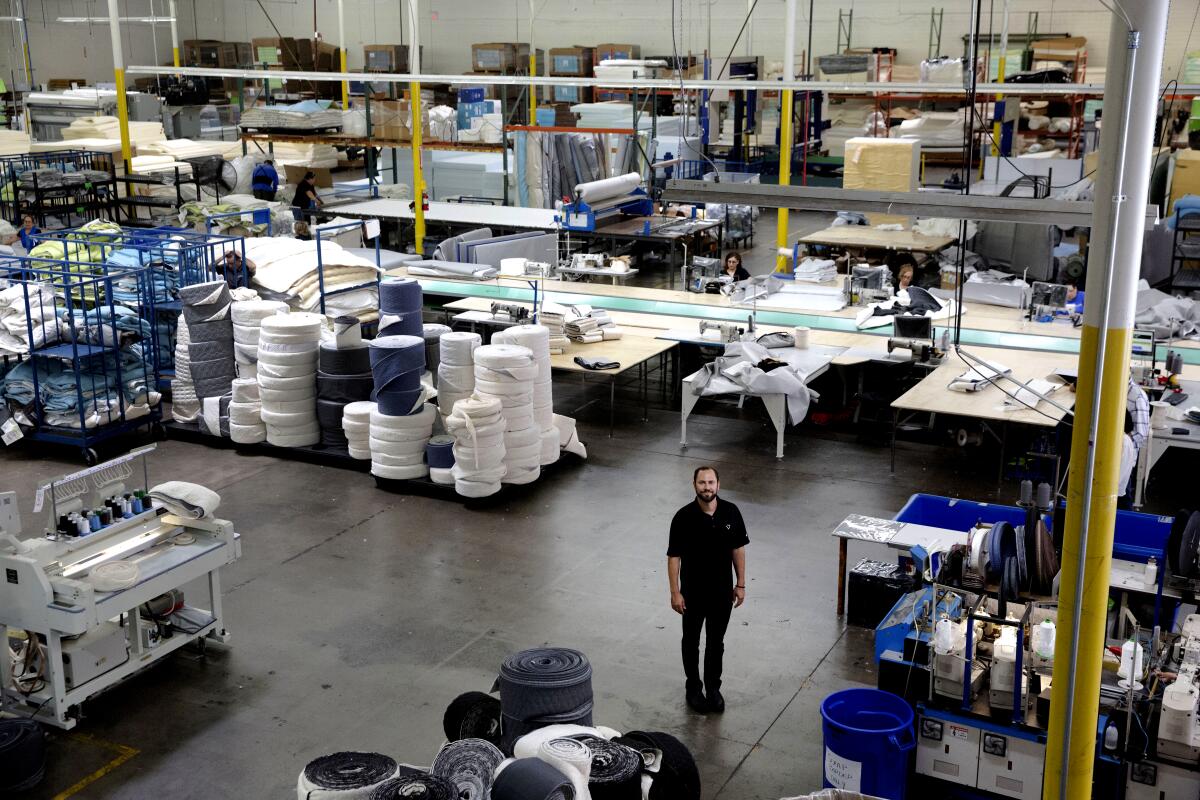Waking up a sleepy California mattress company | How I Made It

- Share via
Shaun Pennington, 39, is president of Diamond Mattress, his family’s 80-year-old company, which is facing major disruption in a traditionally sleepy industry. In the past decade, technology to flatten full-size mattresses like pancakes for easier shipping has revolutionized the landscape, giving way to start-ups such as Casper, Purple and Nectar. Those online newcomers are gnawing at other players’ market shares, thanks in part to aggressive advertising that follows you around the internet. Legacy firms such as Diamond are left figuring out how to adapt. Diamond, with 240 employees and $60 million in sales in 2018, retains a firm hold on its private-label mattress niche with a focus on wellness.
Anything but the family business
As a youngster, Pennington hung out at the factory, licking envelopes and building bunkie boards — pieces of plywood placed under mattresses for support. But when the time came to go to college or work for Dad, Pennington realized, “My family’s been very happy materially and very successful, but internally I didn’t see a ton of satisfaction,” he said. He recalls asking himself, “‘What makes someone really happy? Is there a way toward true happiness, or a more fulfilling life?’” That introspection led Pennington to study religion at UC Santa Barbara and later to seek out a Buddhist studies program in Taiwan. He was even a sixth-grade teacher for a short time, until he realized the lessons and values he wanted to teach were restricted by bureaucratic rules.
An epiphany
Reeling from his failed foray as an educator, Pennington backpacked through Vietnam. He rented a scooter from a family that invited him over for dinner, where he sat on their concrete floor and shared their meager meal, for which he was grateful. Then he had an epiphany.
“If I don’t even try to work with my family business, I don’t even give it a chance, it’d be, to me, so disrespectful to all these people I’m meeting who would die to be in America and have the kind of opportunity I had,” Pennington said. “I just realized how selfish I was being, not actually exploring it.” So he emailed Dad.
Meanwhile, back home...
“It kind of floored me, actually,” Randy Pennington, Shaun’s father said about the email he received, reading, “Hey dad, I want to come work for you.”
“I had to read it three or four times,” the elder Pennington said. “I thought OK, I’ll put him on the factory, doing some sweeping, nasty jobs, and he won’t like it and take off.”
Staying put
Shaun started at Diamond making minimum wage, doing mostly physical labor. On the factory floor, he noticed discrepancies in how the mattresses were made. “I realized, honestly, nobody knows how anything is made here,” he said. “We needed like a recipe book or instructions, somewhere.”
Pennington took a three-ring binder with his dad’s handwritten notes around the factory, quizzing employees on how they made certain types of beds. The answers varied wildly. So Pennington overhauled the system, computerizing the hand-drawn instructions. That feat moved him off the factory floor and into the office. After nearly a decade working for Dad, Shaun Pennington took the reins in 2014.
Bed in a box
It was around that time when the mattress industry was flipped upside down. New technology to squeeze mattresses until they emerged a quarter of their original size “completely shifted the landscape as far as reach,” Pennington said. “Ten years ago, you were regionally based because it was hard to ship a mattress. It’s bulky, easily damaged, hard to move physically and get into a home.”
Now, internet-based companies can easily ship their compressed mattresses, which take up about a third of the space their full-sized counterparts did. That also changed the consumer’s shopping experience, once relegated to showrooms. New sites offered 100-night, at-home trials, along with free shipping and returns. “It was a sleepy industry, but then people come in who are very savvy, digital advertising marketers, and absolutely turned the industry on its head,” Pennington said.
Diamond’s specialty
The mattress manufacturer was never a champion of direct-to-consumer sales. It mostly made them private-label, sold to retailers such as Jerome’s Furniture or Living Spaces, a market where the new competitors don’t play. Pennington said at a typical Jerome’s furniture store in California, about 70% of the mattresses on display are from Diamond, which operates two factories in Compton and another in Texas, totaling 260,000 square feet.
Diamond amped up its marketing and web sales, and now offers the same 100-night trials and free shipping and returns its competitors promote. The company has rebranded from a manufacturer to a “sleep wellness company” that emphasizes the role sleep plays in a person’s wellness.
Still A Family Affair
Pennington works with sister Breana Pennington, who is vice president at Diamond. Married with two young children, Shaun Pennington said he enjoys what he does now, much to the surprise of his teenage self.
More to Read
Inside the business of entertainment
The Wide Shot brings you news, analysis and insights on everything from streaming wars to production — and what it all means for the future.
You may occasionally receive promotional content from the Los Angeles Times.










